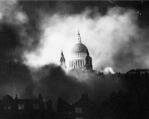History of London continued
The World at War
 |
Despite the death of the longest ever ruling monarch - Queen Victoria - in 1901, the early years of the twentieth century were in many ways a golden age for London. Social, medical, and political advances improved the living standards of more and more citizens, and civic pride continued to manifest itself in impressive buildings and other works.
By 1914, European political rivalries had bolied over into conflict, and the resultant First World War was to shake the complacent British society to its foundations, and rob it of a generation of young men. By the time the guns had fallen silent in 1918, millions had been lost to a futile massacre on the battlefields of Europe. Despite being victorious, Britain's influence was significantly weakened, and the emergent USA was soon to claim world superpower status in its stead.
The interwar years were marked by social advances (women were granted equal voting rights in 1929) and an initial period of economic prosperity. By the 1930's however, prosperity had turned to Depression, as a pall of poverty was cast over many millions of Brits. Ominously at this time Hitler emerged as a political force in Germany, and the war-weary, economically brittle French and British governments failed to act.
By 1939, Europe had again gone up in flames (the Second World War) as Germany's armies went on the march once more. London soon became a target for the Luftwaffe's bombs, and thousands of lives were claimed during The Blitz. Whole suburbs were flattened, and much of London's historical or architectural treasures either destroyed or damaged. War leader Winston Churchill rallied the nation from his headquarters below the streets of London, and eventually the tide of the war turned, with German defeat by 1945.
Modern Britain
This second body blow to the British nation, economy, and social fabric was to remove any vestiges of former imperial glory, and some say that Britain has yet to regain the prosperity and influence enjoyed in the early twentieth century. This is partly true, although standards of living are amongst the highest in the world, and the British economy is still a powerhouse that is matched by few nations. London is the central cog in this economic machine, and is a financial and business centre only rivaled to this day by New York.
The political influence of the nation remains strong on the world stage, and the current Prime Minister is Tony Blair (Labour).
|





